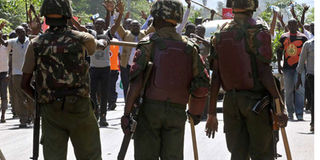AU must now rise and champion electoral reforms across Africa

Police officers stand guard on June 6, 2016 in Kisumu, during anti-Independent Electoral and Boundaries Commission demonstrations. PHOTO | AFP
What you need to know:
Political stability is the panacea for many ills bedevilling African states ever since they attained independence.
Sitting heads of states have been unable to tolerate dissenting voices that appear to criticize their iron fist leadership.
Sitting heads of states readily incarcerate those who seem to embrace political ideologies different from theirs.
Between June 25 and July 2, 2018, African leaders converged in Nouakchott, the capital city of Islamic Republic of Mauritania for the African Union Summit.
Dubbed the 31st Ordinary Session of the Assembly of Heads of State and Government of the African Union (AU), the meeting took place under the theme: “Winning the Fight against Corruption: A Sustainable Path to Africa’s Transformation”.
What stood out at this meeting was the resounding pitch the leaders made for further commitment to the fight on corruption and speedy resolution of the conflict in South Sudan whose president, Mr Salva Kiir, and his former deputy Riek Machar are currently negotiating a lasting peace deal.
Besides these two points, the rest of deliberations at the forum focused on a host of other mundane issues that sound far removed from the daily challenges citizens of African states grapple with and are only relevant for the leaders in power.
As usual, Africans would be forgiven for having harboured high expectations about a forum where sitting presidents and their ministers meet to discuss a host of issues but steer clear of those that seek to promote good governance, democracy and question the legitimacy of their reigns and unnecessarily long hold onto power.
PRACTICAL STEPS
For all its worth, the summit, just like many before it, failed to take practical steps to commit its member states to promote peace, security and stability across the continent.
Though many conflicts in countries across the continent are related to elections and their violent outcomes, it is surprising that AU Summit never found it prudent to place the matter of electoral reforms at the heart of its agenda.
Yet it is these electoral reforms and the strengthening of independent institutions that would sow the seeds of political stability by building trust and confidence in public bodies charged with conducting polls and enabling citizens to accept election outcomes.
It is not in doubt that elections have been the cause of numerous political crises across the continent, which later morph into violence.
In many instances, the trigger has been the tendency by sitting heads of states to manipulate election results, thus extending their stay in power illegitimately.
POLITICAL IDEOLOGIES
Democracy in many African states has remained a pipe-dream. Sitting heads of states have been unable to tolerate dissenting voices that appear to criticize their iron fist leadership and readily incarcerate those who seem to embrace political ideologies different from theirs.
This has stifled freedom of expression in these countries as the incumbents ride on the forced silence to stick to power for decades.
President Paul Biya of Cameroon and President Yoweri Kaguta Museveni of Uganda stand out like sore thumbs, in regard to this.
A host of others, among them Democratic Republic of Congo’s Joseph Kabila, Rwanda’s Paul Kagame and Burundi’s Pierre Nkurunzinza are busy working on removing caps on presidential term limits to perpetuate their stay in power.
For instance, the AU has largely been unable to implement and advance the preparations for the elections in DR Congo even after the parties struck the Saint-Sylvestre Political Agreement of December 31, 2016.
NEW GOVERNMENT
In this agreement, both the government and the opposition Congolese Rally for Democracy were to make necessary compromises to facilitate enactment of pre-agreed provisions of the deal, including the appointment of a Prime Minister.
The formation of a new government, as prescribed by the agreement, would pave the way for elections and the DRC’s first peaceful, democratic transfer of power through the expressed will of the Congolese people. This has remained a still-birth.
The AU was unable to use its clout to bear on the two camps to meet their sides of the bargain. The failure to implement the resolutions has had dire economic and political consequences.
Sections of the population have suffered due to local insurrections and inter-communal conflicts that have resulted in one of the world’s worst humanitarian crises.
The AU has also failed to implement a new road map for Central African Republic, which was plunged into a political crisis in 2017, causing displacements and untold suffering to civilians.
ARMED GROUPS
As all this unfolds, the AU stands by, unable to send in a force that could disarm armed groups that are waging guerrilla warfare over zones of influence and resources.
Time has come for the AU to grab the bull by the horns and strike a blow for good governance and democracy across the continent.
Political stability is the panacea for many ills bedevilling African states ever since they attained independence.
However it cannot be attained without credible elections, whose outcomes not only affirm the will of the citizens but are also backed by the rule of law.
The AU must now make this its top priority agenda.
Mr Sangura, the bursar at Teremi High School, is an MBA student at Kibabii University. [email protected].




